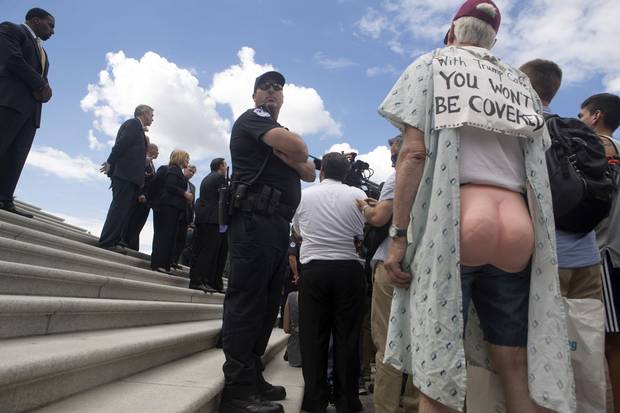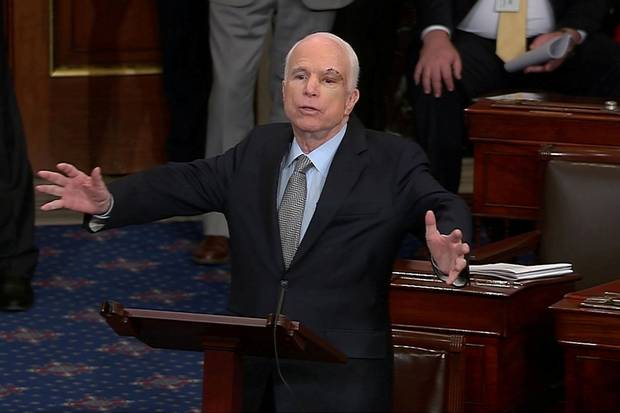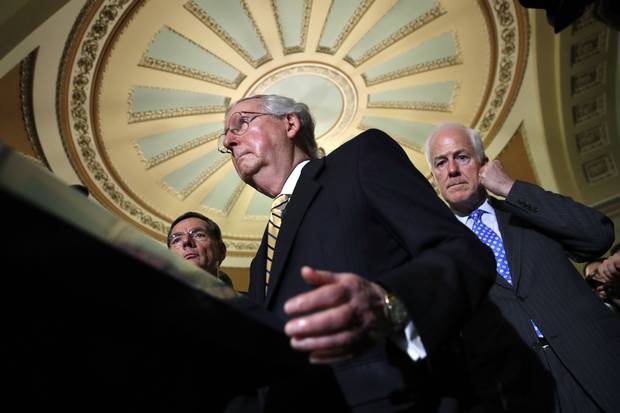Votes in the Senate: Which is which?
The Senate has been in heated debate over the future of the Affordable Care Act, the signature health-care law of Republican President Donald Trump's Democratic predecessor, Barack Obama.
- The step forward: Majority Leader Mitch McConnell won a 51-50 vote to begin debating the GOP drive against Obama’s Affordable Care Act, which sits atop the Republican Party’s legislative priorities. For the purposes of this explainer, we will refer to this as Vote 1. Pressure and deal-making helped win over vacillating Republicans to win Vote 1 and begin debate, but they remained fragmented over what to do next.
- The setback: After the first vote, Mr. McConnell tried to push forward a proposal to replace Mr. Obama’s health-care law with a far more restrictive GOP substitute. He lost that vote (let’s call it Vote 2) by 57-43.
- The next setback: On Wednesday night, Vote 3 was for a simple repeal of Obamacare, which would have left lawmakers with a two-year window to come up with a replacement. The Republicans lost that vote too, 55-45.
- The next next setback: After a marathon debate Thursday and early Friday morning, Vote 4 was a test for the “skinny repeal” version, which would have repealed only a few parts of the Affordable Care Act. Three Republican senators – John McCain (more on him later), Susan Collins and Lisa Murkowski – crossed party lines to join Democrats and defeat the bill in a dramatic 51-49 vote.

Democratic senators speak outside the Capitol on July 25, 2017.
STEPHEN CROWLEY/THE NEW YORK TIMES
What the GOP wants to do to Obamacare
Plan A: Mr. McConnell's failed proposal from Tuesday night would have erased the Affordable Care Act's tax penalties on people not buying insurance, cut Medicaid and trimmed its subsidies for consumers. It included a provision by Republican senator Ted Cruz letting insurers sell cut-rate policies with skimpy coverage, as well as an additional $100 billion – sought by Midwestern moderates including Senator Rob Portman of Ohio – to help states ease out-of-pocket costs for people losing Medicaid.
Plan B: The next option was a simple repeal of the Affordable Care Act, leaving a two-year window to find a replacement that lawmakers could agree on.
Plan C: The "skinny repeal" plan would have repealed parts of the statute like its tax penalties on people not buying coverage, but leave Medicaid basically untouched – a tactic aimed chiefly at letting Senate-House bargainers seek a final compromise.

U.S. Senator John McCain speaks on the floor of the U.S. Senate after returning to Washington for a vote on health-care reform on July 25, 2017.
SENATE TV/REUTERS
McCain's first big moment: A dramatic comeback and a dire warning
John McCain of Arizona made a dramatic return to the Senate chamber on Tuesday night, soon after brain surgery to treat an aggressive brain cancer. But after backing his party on Vote 1, he condemned the tribal politics besetting the nation and served notice he would not vote for the GOP legislation as it stands now.
After he voted, McCain stood at his seat and accepted hugs and handshakes from senators in both parties, drawing laughter from the spectators' gallery when he and Vermont Senator Bernie Sanders exchanged an awkward embrace. Mr. McCain then spoke his mind. His face was pale, cheek bruised, a red scar and stitches above his left eye where doctors had removed a blood clot. But his voice was strong.
John McCain makes plea for co-operation on Senate floor
On partisanship: He bemoaned the lack of legislative accomplishments in the current Congress and the GOP's secretive process in working on repealing Obamacare:
[Republicans are] coming up with a proposal behind closed doors in consultation with the administration, then springing it on skeptical members, trying to convince them that it was better than nothing. I don't think that's going to work in the end, and it probably shouldn't.
On bipartisanship: Debates in the Senate have become "more partisan, more tribal, more of the time than at any time I can remember," he lamented. He issued a plea for Democrats and Republicans to work together. Mr. Obama and the Democrats shouldn't have pushed the Affordable Care Act through on party-line votes when they controlled Washington back in 2010, McCain said, "and we shouldn't do the same with ours. Why don't we try the old way of legislating in the Senate?" That would involve committee hearings and testimony from experts and interested parties, an incremental process that could take months.
On the President: The Arizona senator has emerged as one of Donald Trump's most outspoken GOP critics. With President Donald Trump threatening electoral retribution for Republicans who don't toe the line, McCain urged senators to stand up for their own constitutional status:
Whether or not we are of the same party, we are not the president's subordinates, We are his equal!
McCain's second big moment: The vote that made the difference
Video Watch McCain give a thumbs down on Obamacare repeal
On Friday night, when the "skinny repeal" option came up for a vote, Mr. McCain cast the decisive vote to defeat the proposal, joining two other Republicans, Susan Collins of Maine and Lisa Murkowski of Alaska, in opposing it. In a statement afterward, he said that skinny repeal was a "shell of a bill" that didn't offer a compelling replacement for Obamacare, and that a bipartisan approach was needed to get a bill that works:
From the beginning, I have believed that Obamacare should be repealed and replaced with a solution that increases competition, lowers costs, and improves care for the American people. The so-called ‘skinny repeal’ amendment the Senate voted on today would not accomplish those goals. While the amendment would have repealed some of Obamacare’s most burdensome regulations, it offered no replacement to actually reform our health care system and deliver affordable, quality health care to our citizens. The Speaker's statement that the House would be ‘willing’ to go to conference does not ease my concern that this shell of a bill could be taken up and passed at any time.
I’ve stated time and time again that one of the major failures of Obamacare was that it was rammed through Congress by Democrats on a strict-party line basis without a single Republican vote. We should not make the mistakes of the past that has led to Obamacare’s collapse, including in my home state of Arizona where premiums are skyrocketing and health care providers are fleeing the marketplace. We must now return to the correct way of legislating and send the bill back to committee, hold hearings, receive input from both sides of aisle, heed the recommendations of nation’s governors, and produce a bill that finally delivers affordable health care for the American people. We must do the hard work our citizens expect of us and deserve.
After the bill's defeat, Senate Minority Leader Chuck Schumer told the Senate that it was time to heed McCain's call this week to return to a more transparent and bipartisan legislative process. Mr. Schumer told reporters that he and Mr. McCain had been talking four or five times a day this week about the pared-down bill and that McCain had made up his mind on Thursday afternoon. "John McCain is a hero," Mr. Schumer said.
Trump's last words: 'let Obamacare implode, then deal'
The defeat of the GOP's last-resort option has cast doubt on whether divided Senate Republicans can advance any health bill, despite seven years of promises to repeal the Affordable Care Act and Mr. Trump's urgent appeals that they do so. After the vote, Mr. Trump responded angrily on Twitter, saying the senators had let Americans down.
3 Republicans and 48 Democrats let the American people down. As I said from the beginning, let ObamaCare implode, then deal. Watch!
— Donald J. Trump (@realDonaldTrump) July 28, 2017
With a report from The New York Times
POLITICS IN THE TRUMP ERA: MORE FROM THE GLOBE AND MAIL


